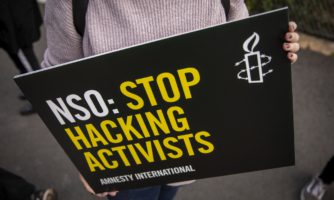
Governments failed to adequately respond to the devastating impact of worsening economic conditions, exacerbated by global events such as the war in Ukraine and local factors such as conflict and climate-related disasters, on the human rights of millions of people to food, water, housing and healthcare.
Armed conflicts continued to devastate the lives of millions of people across the Middle East and North Africa. Civilians faced indiscriminate attacks, destruction of vital infrastructure, forced displacement and abusive rule by unaccountable militias, armed groups or security forces. Lebanon and Jordan continued to host millions of Syrian refugees, but both countries adopted coercive policies to pressure refugees to return. Authorities failed to secure safe return of millions of internally displaced people to their places of origin.
Governments continued to use draconian measures to repress the rights to freedom of expression, association and peaceful assembly. Authorities censored or silenced online and offline media. They subjected human rights defenders, journalists, protesters, women’s rights campaigners, political activists and other critics or dissidents to arbitrary detention, unfounded criminal prosecutions, unfair trials, imprisonment, travel bans, threats and other forms of harassment. Security forces used unlawful, sometimes lethal, force and mass arrests to crush protests.
Other human rights violations included discrimination against ethnic and religious minorities, enforced disappearances, torture and other ill-treatment, and the use of the death penalty and other cruel, inhuman or degrading punishments.
Three events in particular highlighted human rights issues in the region. In September, the death in custody of Mahsa (Zhina) Amini following her arrest by Iran’s so-called “morality police” for violating the country’s abusive veiling laws sparked unprecedented protests calling for an end to the Islamic Republic and the establishment of a system respecting human rights and equality. In November, Egypt hosted COP27, which exposed its abysmal human rights record and the plight of the tens of thousands of people languishing in Egyptian jails for political reasons. It also highlighted the failure of governments worldwide to take the necessary action to avert the climate crisis and tackle environmental degradation. Later in November, Qatar staged the football World Cup, drawing attention to the plight of Qatar’s migrant workforce, some working in conditions that amounted to forced labour. Many migrant workers across the region experienced similar conditions. The World Cup also highlighted discrimination against LGBTI people in Qatar.
Read Moreعنوان: 114 شارع القاهرة، بناية مسابكي-سرحال، قسم أ، الطابق السابع، الحمرا، بيروت لبنان
+961 1 748751